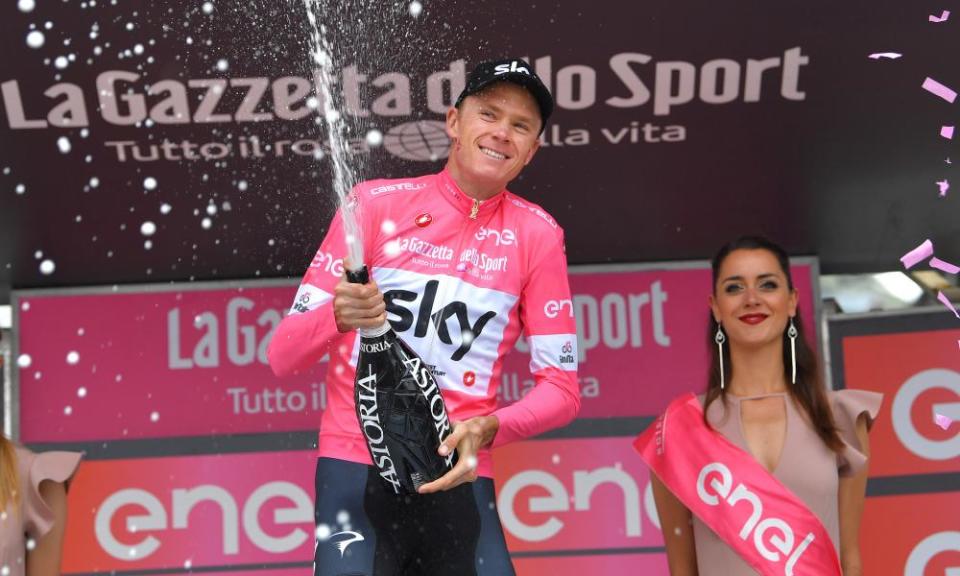Chris Froome set for Giro d’Italia glory despite being spat at by fan

Shortly after Chris Froome conquered the final summit of this year’s Giro d’Italia, and the realisation sunk in that he would be the first Briton to win the maglia rosa, he described the race as the “battle of his career”. Yet strangely after three weeks of vicious riding, the last significant skirmish on the way to Cervinia saw barely a blow attempted – at least on the road.
Off it, however, it was a different story. For while Froome was cheered on by the majority of the huge crowd, he was also reminded that not everyone believes in him as one spectator rushed out and spat at him three kilometres from the finish. Afterwards Froome said that he had not seen the incident. But his team-mate Wout Poels certainly did, looking around in understandable horror.
Froome also faced more questions about his stunning solo victory on Friday – with one reporter asking whether, unlike other great performances in the past such as Floyd Landis at the 2006 Tour de France, it would stand the test of time.

“I can understand the parallels and comparisons being drawn by some people,” he replied.
“But I have every confidence it will stand.” He also said that, contrary to some reports, his race data from Friday’s stage – where he reckoned he rode an average of 350 watts for three hours – was available to race organisers.
“I’d be very surprised if the data isn’t there,” he added. “I have been riding around with an extra 100 metregram receiver of theirs the last three weeks. I’d be disappointed if they don’t have the data.”
Froome also pledged, yet again, that he would be cleared of any wrongdoing after being found with double the permitted levels of salbutamol in his system at the Vuelta last September – as first revealed by the Guardian. “I have a clear conscience,” he said. “When the time is right, all the information will be shared with everyone and I am sure people will see it from my point of view.”
For now, though, Froome wants to purely focus on celebrating becoming the first man in 35 years to hold all three grand tours – the Tour de France, the Vuelta a España and the Giro – at the same time, joining Bernard Hinault and Eddy Merckx in the pantheon.
True, there is still one more stage remaining. But the 10 laps of 11.5km around Rome on Sunday evening will be largely processional. To Froome, each one will feel like a fresh victory parade.
“It is a very special win,” said Froome. “I know it is not over until Rome but the battle is over now. But there were so many moments when it was extremely hard.”
And while beaming from ear to ear, he admitted that there were times he didn’t think his fifth grand tour victory was on the cards.
“Obviously the crash right before the prologue in Jerusalem really knocked my confidence, and I was in a lot of pain after that,” he said. “And there were also days where I should have finished in front and I didn’t and I lost time so there have been so many hurdles to overcome. And as we have seen from some, when you have a bad day in these last few days of the Giro you don’t just lose minutes, you can lose tens of minutes.
“But my team-mates and the support staff believed in me. They said: ‘Wait, this race is brutal and you are going to get to the last few days and the race can really change.’ And it did.”
That was evident on stage 20 as the Frenchman Thibaut Pinot, who started the day in third, lost a staggering 45 minutes – a similar amount that Simon Yates lost on Friday. Froome, however, never looked in any danger of letting slip the 40 seconds he had over his nearest challenger Tom Dumoulin.
In theory, the 214km from Susa to Cervinia looked to possess sharp enough teeth to make Froome fear its bite. The final 90km had three climbs, each amounting to almost 20km in duration – with 4,000m of rise and fall along the way. Yet he was only rarely tested and never troubled. After three weeks where he had looked short of his best, Froome the Imperious was back.
While the Spaniard Mikel Nieve pulled away on the final climb to celebrate his 34th birthday with a stage win, Froome focused purely on man-marking Dumoulin up the Col Tsecore and then the Col St-Pantaléon.
Finally with six kilometres remaining on the road to Cervinia, Dumoulin went for it, attacking three times in rapid succession only to find Froome locked onto his wheel each time he looked over his shoulder. “I gave everything I had,” said Dumoulin. “He was too strong for me. I have no regrets.”
Not only was it not enough, but Froome actually looked stronger than ever towards the finish. Indeed, as he made his way over the steepest stretch of the final climb, just before Valtournenche three kilometres out, he powered clear of Dumoulin in a defiant show of strength. As he did so he passed bunches of pink Giro d’Italia balloons, some of which had been popped.
A few days ago, when he was fourth in the race and struggling with saddle sores, Froome had looked similarly deflated. But, once again, he and Team Sky somehow found the resolve to deliver when it mattered.

 Yahoo Sport
Yahoo Sport 





































